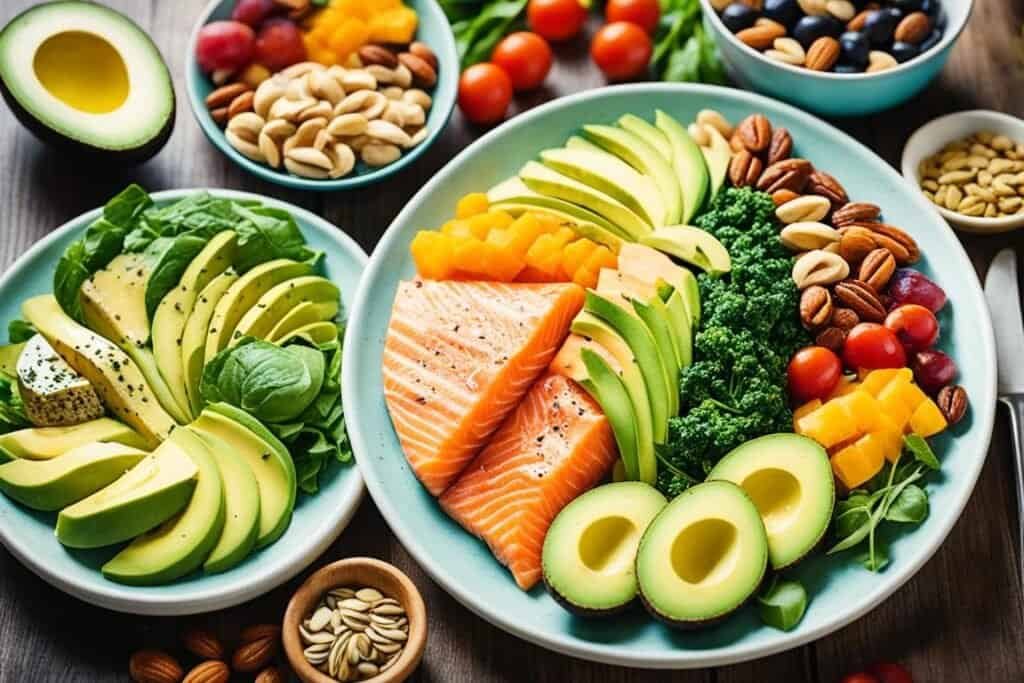Welcome to our article on lower cholesterol. Understanding how your body naturally reduces cholesterol levels is essential for maintaining good heart health. High levels of LDL cholesterol, also known as “bad” cholesterol, can lead to clogged arteries and an increased risk of heart disease. On the other hand, HDL cholesterol, or “good” cholesterol, helps remove cholesterol from the blood vessels, reducing the risk of cardiovascular issues.
While the body naturally produces cholesterol, certain lifestyle factors, such as diet, exercise, and smoking, can impact cholesterol levels. Making changes to your diet by incorporating cholesterol-lowering foods and adopting natural ways to reduce cholesterol can significantly contribute to managing your cholesterol levels effectively. Additionally, maintaining a healthy weight, engaging in regular exercise, quitting smoking, and consuming alcohol in moderation are essential aspects of cholesterol management.
In this section, we will explore how the body lowers cholesterol levels, discuss the role of cholesterol-lowering foods, and provide some valuable cholesterol management tips to help you maintain a healthy heart.
Key Takeaways:
- The body naturally produces cholesterol, but lifestyle factors can influence cholesterol levels.
- Lowering cholesterol requires a combination of dietary changes, exercise, and other lifestyle modifications.
- Cholesterol-lowering foods, such as those rich in monounsaturated and polyunsaturated fats, can make a positive impact on cholesterol levels.
- Incorporating soluble fiber into your diet can help reduce the absorption of cholesterol in the bloodstream.
- Regular exercise, maintaining a healthy weight, quitting smoking, and moderate alcohol consumption are all important aspects of cholesterol management.
Focus on Monounsaturated Fats and Polyunsaturated Fats
Including monounsaturated fats and polyunsaturated fats in your diet can help lower LDL cholesterol levels and increase HDL cholesterol levels. These healthy fats are essential for maintaining a healthy heart and overall cardiovascular health. Let’s take a closer look at some cholesterol-lowering foods rich in monounsaturated and polyunsaturated fats.
Monounsaturated Fats
Monounsaturated fats are a type of healthy fat that can help improve cholesterol levels. By replacing saturated and trans fats with monounsaturated fats, you can lower your risk of heart disease and promote overall heart health. Some examples of foods high in monounsaturated fats include:
- Olive oil
- Nuts (such as almonds, walnuts, and cashews)
- Avocados
- Olives
These delicious ingredients can be easily incorporated into your daily meals, whether it’s drizzling olive oil on your salad or adding a handful of nuts to your morning yogurt.
Polyunsaturated Fats
Polyunsaturated fats are another beneficial type of fat that can lower LDL cholesterol levels and reduce the risk of heart disease. Omega-3 fatty acids, a type of polyunsaturated fat, are particularly important for heart health. Foods rich in polyunsaturated fats include:
- Fatty seafood (such as salmon, mackerel, and trout)
- Fish oil supplements
- Shellfish (such as oysters and crab)
Adding these sources of polyunsaturated fats to your diet can have numerous health benefits. Omega-3 fatty acids have been shown to decrease inflammation, improve cardiovascular function, and support brain health.

Limit Trans Fats and Eat Soluble Fiber
When it comes to managing your cholesterol levels, it’s crucial to be mindful of the types of fats you consume. Trans fats, commonly found in processed foods and baked goods, can significantly raise LDL cholesterol levels and decrease the good HDL cholesterol that helps remove cholesterol from your bloodstream.
To reduce your intake of trans fats, it’s important to read food labels and choose products that are trans fat-free or contain low amounts of trans fats. Opt for healthier alternatives such as cooking with oils that are high in monounsaturated and polyunsaturated fats, such as olive oil or canola oil.
In addition to limiting trans fats, incorporating foods rich in soluble fiber into your diet can also help lower cholesterol levels. Soluble fiber has the ability to bind with cholesterol in your digestive system, preventing it from being absorbed into your bloodstream.
Excellent sources of soluble fiber include:
- Oat cereals
- Beans
- Lentils
- Brussels sprouts
- Fruits, such as apples and oranges
- Peas
- Flaxseeds
By opting for these cholesterol-lowering foods, you can support your body in reducing its cholesterol levels naturally. Making these simple dietary changes can have a significant impact on your overall heart health.

| Food | Soluble Fiber Content |
|---|---|
| Oat cereals (1 cup) | 4 grams |
| Beans (1/2 cup, cooked) | 4 grams |
| Lentils (1/2 cup, cooked) | 4 grams |
| Brussels sprouts (1/2 cup, cooked) | 2 grams |
| Fruits (1 medium-sized fruit) | 1-2 grams |
| Peas (1/2 cup, cooked) | 4 grams |
| Flaxseeds (1 tablespoon) | 1.9 grams |
Incorporate Exercise and Maintain a Healthy Weight
Regular exercise plays a vital role in maintaining a healthy heart and managing cholesterol levels. When you engage in physical activities, it can help lower LDL cholesterol, often referred to as “bad cholesterol,” while increasing HDL cholesterol, known as “good cholesterol.” To maintain a healthy heart, the American Heart Association recommends getting at least 150 minutes of moderate aerobic exercise per week. This can be achieved through activities such as brisk walking, cycling, swimming, or dancing.
Combining aerobic exercise with strength training can provide even greater benefits. Strength training exercises, such as lifting weights or using resistance bands, help build muscle mass and boost your metabolism. This can enhance your overall cardiovascular health and further support cholesterol management.
Alongside exercise, maintaining a healthy weight is crucial for managing cholesterol levels effectively. Excess weight, especially around the waistline, can contribute to higher LDL cholesterol and lower HDL cholesterol. Losing weight through a combination of regular physical activity and a balanced, nutritious diet can lead to decreased LDL cholesterol levels and increased HDL cholesterol levels. It’s essential to aim for a healthy weight range based on your age, height, and body composition.
Adopting a healthy lifestyle that includes regular exercise and weight management plays a significant role in achieving and maintaining optimal cholesterol levels. By making physical activity a part of your daily routine and striving for a healthy weight, you can support your heart health and promote overall well-being.
Quit Smoking and Consume Alcohol Moderately
Smoking is not only detrimental to your overall health but also has a negative impact on your cholesterol levels. When you smoke, the harmful chemicals in cigarettes can lead to an increase in your LDL cholesterol, commonly known as “bad” cholesterol, and a decrease in your HDL cholesterol, also known as “good” cholesterol. This imbalance in cholesterol levels can contribute to the development of heart disease and other cardiovascular problems.
If you are a smoker, quitting smoking can significantly improve your cholesterol profile. When you quit smoking, your body begins to repair the damage done by smoking, and your HDL cholesterol levels start to increase while your LDL cholesterol levels decrease. This positive change in your cholesterol levels can help reduce the risk of heart disease and improve your overall cardiovascular health.
It’s also important to note that consuming alcohol should be done in moderation. While some studies suggest that moderate alcohol consumption may increase HDL cholesterol levels, excessive alcohol intake can have adverse effects on your health, including elevating your triglyceride levels, blood pressure, and risk of developing heart disease. Therefore, it is crucial to consume alcohol responsibly and in moderation, keeping in mind the impact it can have on your cholesterol levels and overall well-being.
In summary, quitting smoking is a significant step towards improving your cholesterol levels and overall heart health. By eliminating smoking from your lifestyle, you can raise your HDL cholesterol, lower your LDL cholesterol, and reduce the risk of heart disease. Additionally, it’s essential to consume alcohol in moderation and be mindful of its impact on your cholesterol levels. Remember, taking control of your lifestyle choices can have a profound effect on your cholesterol management and overall well-being.
Conclusion
Lowering cholesterol levels requires a comprehensive approach that combines lifestyle changes with appropriate medications or supplements. By making dietary adjustments, incorporating healthy fats, limiting trans fats, and increasing soluble fiber intake, you can positively impact cholesterol management. Regular exercise, maintaining a healthy weight, quitting smoking, and moderating alcohol consumption are also crucial factors in managing cholesterol levels.
If these lifestyle changes do not effectively lower cholesterol, it is important to consult with a healthcare professional. They may recommend cholesterol-lowering medications or supplements to further manage your cholesterol levels. Working together with a healthcare provider will help determine the most suitable approach for your individual circumstances. Remember, it is essential to prioritize the well-being of your heart and overall health by actively managing your cholesterol levels.
For more information on high cholesterol remedies, effective cholesterol-lowering medications, and overall cholesterol management, reach out to a healthcare professional today and take control of your heart health.

